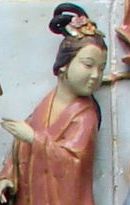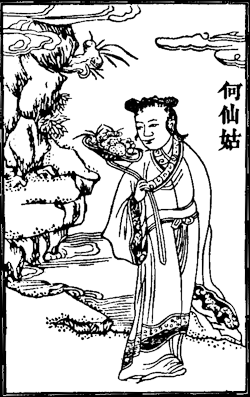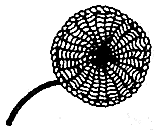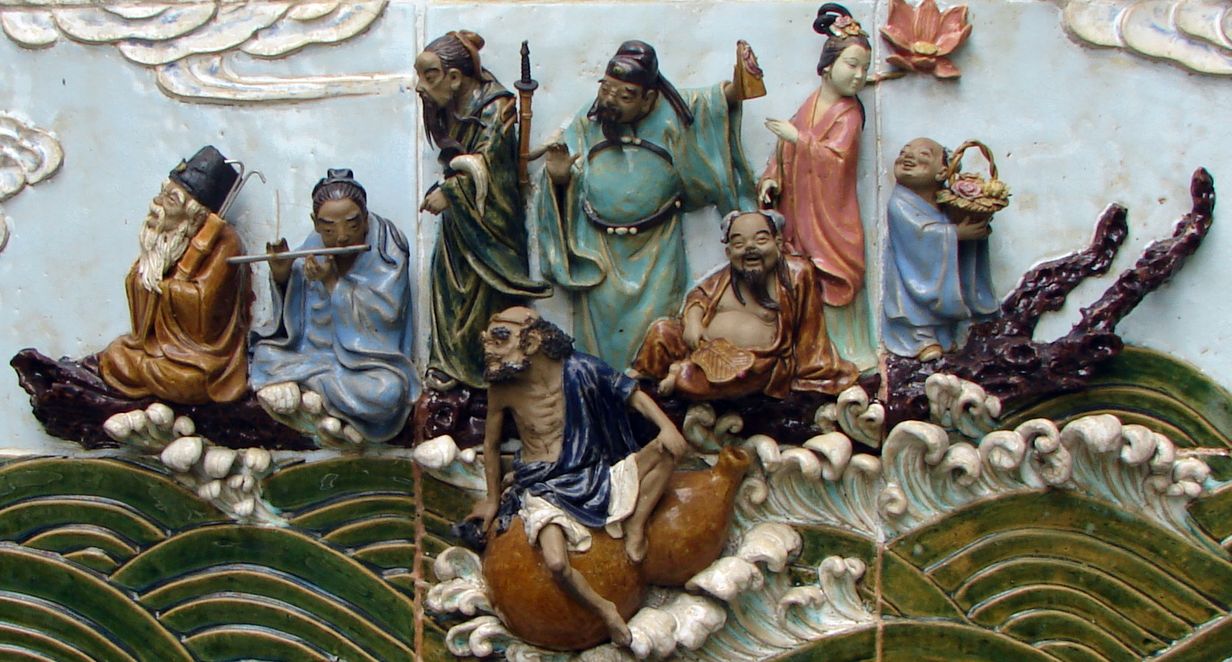
Content created: 2010-12-30
File last modified:
Go to previous or next story,

HÉ Xiāngū 何仙姑 = a daughter of the Hé family, unfortunately rather bald
Madame HÉ 何 = her mother, perpetually puzzled
LǏ of the Iron Crutch (LǏ Tiěguǎi 李铁拐) = a Daoist immortal (story 2)
LÁN Cǎihé 蓝菜和 = another one (story 5)
Empress WǓ Zétiān 武则天 = an empress

Once upon a time, in the reign of Empress Wǔ 武 (reign 12a-6), who loved Daoism, a little girl was born to a family with the surname Hé 何.
Some say that she was the daughter of a shopkeeper in Línglíng County 零陵县 in Húnán 湖南 Province. Others say that her family lived in Zēngchéng County 增城县 in Guǎngdōng 广东 Province. Some say her father was named Hé Tài 何泰, others that he was named Hé Sù 何素, but nobody knows who Hé Tài was, or Hé Sù either. And no one knows the maiden’s name, so she is called Xiāngū 仙姑, which means “immortal maid.”
She was a pretty baby, except that on her head she had only six hairs, and tradition holds that they were all she ever had, although artists politely paint her as a beautiful maid with a full head of hair.
Having only six hairs upon one’s head is a condition that makes a person thoughtful. What is a beautiful girl to do who has but six hairs upon her head?
The answer is to study the Way. When Hé Xiāngū was fourteen or fifteen, and therefore clearly of an age to be married, she and her mother moved to a place called Mother-of-Pearl River (Yúnmǔ Xī 云母溪), in the Mother-of-Pearl Mountains (Yúnmǔ Shān 云母岭), twenty old-style miles to west of Zēngchéng. There she had a dream in which an immortal came to her and said, “You are actually an immortal from the higher realms. You must eat Mother-of-Pearl powder, which will make your body ethereal so that you can return there.”

So this she did.
It seemed to have little effect at first, but over time she found her body was becoming lighter and lighter, and although she wandered in the mountains every day gathering mountain products to feed her mother, she herself seemed to require ever less food. And indeed her wanderings gradually became less and less demanding, more like floating, as she seemed to drift over the landscape.
Meanwhile, her mother kept trying to arrange marriages for her, although she had no interest in marriage. Indeed, she wanted none of it, for her attention was consumed now with her magical travels.
One day beside a river she ran into the immortals LǏ of the Iron Crutch (LǏ Tiěguǎi 李铁拐) and LÁN Cǎihé 蓝菜和, the Eternal Teenager, whom we have already met in earlier tales. They told her that she had the breath of an immortal (xiānqì 仙气) about her, and that if she chose to study the Way, she would surely succeed.
This was exactly what she wanted to do, she told them. But she added that, alas, she lacked a teacher. And so it was that Lǐ of the Iron Crutch and Lán Cǎihé, the Eternal Teenager, passed on the secrets of the Way to the beautiful maid with only six hairs. The more she practiced, the more she mastered. Among other things, she learned to fly, and she flew into the mountains and communed with the many female immortals who lived in the heavenly realms .
Hé Xiāngū’s mother was curious about her frequent prolonged absences, hoping perhaps that a potential husband was involved, and asked her over and over about them. Finally the girl told her. Her mother was incredulous. First her daughter refused to be married. Now she claimed she was flying around the mountains talking to fairies! It is even said that one day when she was cooking the evening rice she abruptly rose into the air, still holding a ladle.
Time passed, and Hé’s reputation for magic gradually spread, until eventually it came to the ear of the Empress Wǔ herself, who, being interested in spiritual things, wanted to meet her. The empress sent a delegation to the mountain to demand her presence, and to carry her back to the palace in a sedan chair. Knowing that hermits tended to be uncomfortable about visiting palaces, the empress even made sure that it was a very nice sedan chair, although one with heavy locks. Still, as the bearers approached the palace, the chair suddenly became lighter, and when they looked inside Hé Xiāngū had mysteriously vanished. Over and over the empress sent investigators to find her, but always without success.

No one knows what happened. Some say that Lǐ of the Iron Crutch escorted her off into the heavens, and did so in broad daylight, when many could see the ascension. Some years later some people claimed to see her riding a colored cloud. Later still others reported seeing her walking in the mountains.
Artists represent Hé Xiāngū with a full head of hair, of course. But they also show her holding a lotus as a symbol of her openheartedness, or carrying a peach as a symbol of her immortality, or playing celestial music on a kind of reed instrument called a shēng 笙.

Return to top
Go to
previous or next story,